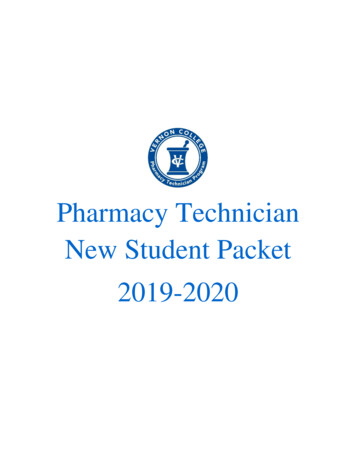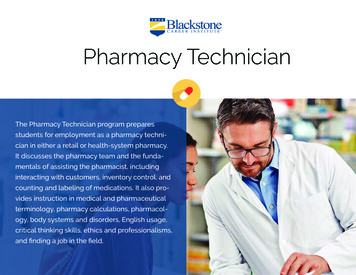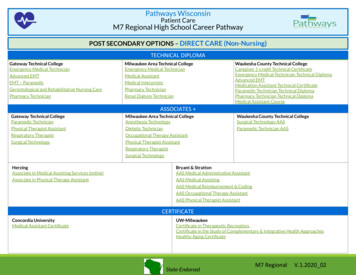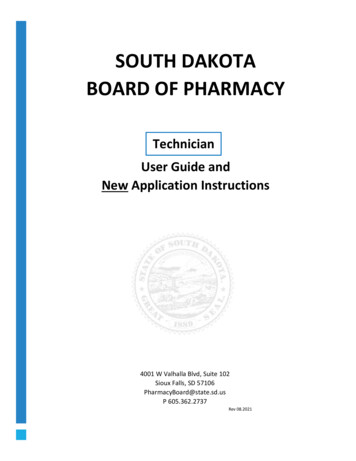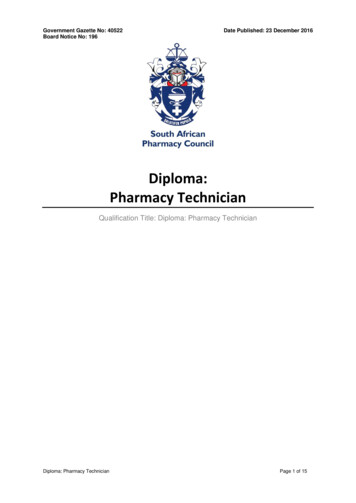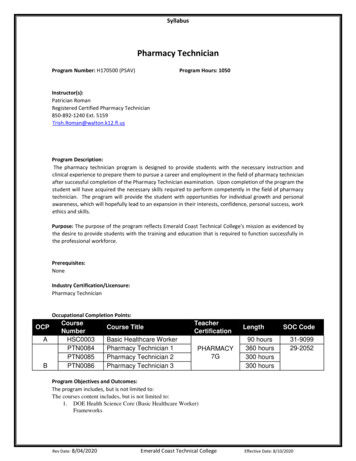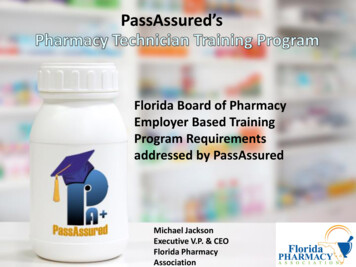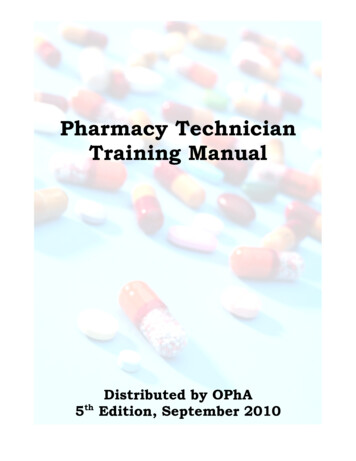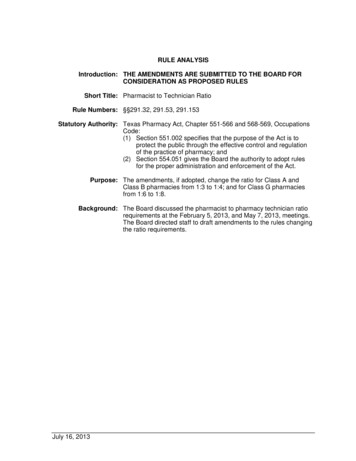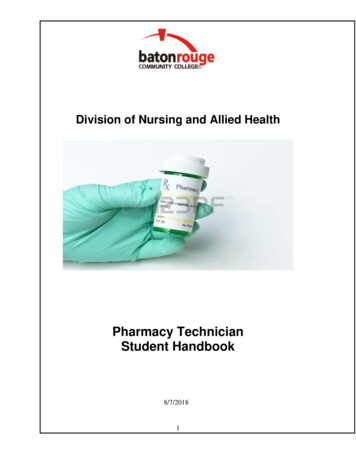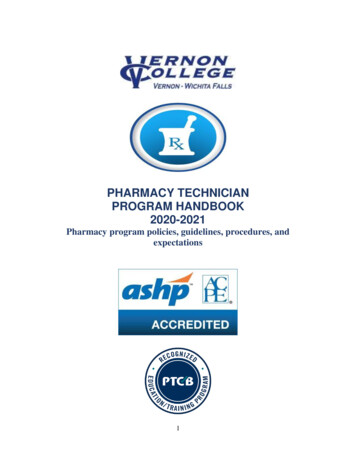
Transcription
PHARMACY TECHNICIANPROGRAM HANDBOOK2020-2021Pharmacy program policies, guidelines, procedures, andexpectations1
DISCLAIMER CLAUSEThis Handbook is intended to provide guidelines andprocedures for the Pharmacy Technician Program and doesnot create a contract between the student and Vernon College,nor confer any contractual right upon the student. VernonCollege reserves the right to make changes to this Handbook atany time without prior notice.2
TABLE OF CONTENTSWelcome and IntroductionProgram Contact InformationPharmacy TechnicianProgram Descriptions & CurriculumCourse DescriptionsProgram GoalsWECM Description of Pharmacy Technician ProgramTexas Administrative Code DescriptionJob Description per TSBPAdmission PolicyCriminal BackgroundTSBP Training RegistrationProgram LengthImmunization PolicyFERPAConfidentiality and HIPAA Rules and RegulationsStudent Confidentiality AcknowledgementProfessional ConductCode of EthicsSocial Media PolicyDrug ScreeningProgram Dress Code and Grooming PolicyProgram Attendance Policy (Clinical Absences, Exemptions, Tardies)Program Evaluation and Grading PolicyAcademic IntegrityProgram Discipline PolicyProgram Probation PolicyDismissal from the ProgramRe-entry PolicyStudent Parking PolicySafety PolicyStudent InsuranceDrug and Alcohol PolicyADA AccommodationsCollege Security and Campus PoliceInstructor and Student ConferencesGuidance and CounselingPass Center, New Beginnings and LibraryGraduationStudent Technical StandardsPracticum Site Search AuthorizationHospital VisitationNational Certification -36363738383839
WELCOMEWelcome to the Vernon College Pharmacy Technician program. The PharmacyTechnician program prepares students to take the Pharmacy Technician CertificationExam (PTCE) or the Exam for the Certification of Pharmacy Technicians (ExCPT) uponcompletion of the program. The Pharmacy Technician program faculty and staff hopethat you find the profession of pharmacy technician a rewarding, challenging, andprofitable career.You will be given the best possible preparation during the didactic (classroom/internet),laboratory and clinical practicum sections of the program to achieve your educationgoals. It will be our goal to provide you the best opportunity possible for success in theprogram.During the first few weeks and months in this training program, you will need to learncooperation. Your first and closest associates will be your colleagues—those fellowstudents who occupy the chairs around you. As a member of the class, it is yourimmediate responsibility to work together. You will need to accept the attitudes andideals of some class members that are very much different from your own. Wheneverthere is discontentment or disharmony within the class, the goals of the class cannot bereached successfully. A student who can discuss, demonstrate, and debate in the propermanner is an individual who will learn. In any profession, in order to be successful, aperson must be able to listen, ask questions, express opinions, correct mistakes, and makeuse of his or her abilities. Try and keep your relationship with your colleagues on anequal level. Help each other. Discuss and solve your problems together. A competitiveatmosphere is desirable because competitiveness propagates success. We hope that youwill find the Program to be fun and exciting as you obtain the skills and knowledgeneeded to be a successful Pharmacy Technician. Again, welcome!Sincerely,Katrina Gundling, CPhTPharmacy Technician Instructor/Program Coordinator4
INTRODUCTION:The purpose of this handbook is to detail policies and procedures specific to thisprogram. The handbook is constructed to be used as a supplement to the Vernon CollegeStudent Handbook and serves to bridge the overriding policies of the College with thepolicies specific to this program. The policies and procedures set forth in this handbookare designed to support the success of the student. Students enrolled in allied healthprograms are expected to agree to and abide by the Student Discipline Policy and StudentRights and Responsibilities regulations as outlined in the Vernon College StudentHandbook.This handbook should be used as a supplement to the Vernon College Student Handbook.You should keep this handbook in an easily accessible location, as it contains valuableinformation you will need in the coming year.A copy of the Vernon College Student Handbook is available on our website and may bedownloaded from the Vernon College website at: https://www.vernoncollege.eduStudents must also abide and follow all policies and procedures of Vernon College.Policies are subject to change and all students will be responsible to adhere to any policychange.The Vernon College Pharmacy Technician program prohibits discrimination. Access tothe programs or its activities shall not be limited on the basis of race, color, religion,national origin, age, gender, sexual orientation, political affiliation, or disabilityPROGRAM CONTACT INFORMATION:Program Coordinator:Katrina Gundling, CPhTProgram E-Mail:kgundling@vernoncollege.eduProgram Phone Number:940-696-8752 Extension 3231Program Fax Number:940-689-3822Program Address:Pharmacy Technician ProgramVernon College, CCC4105 Maplewood Avenue, Suite 2304Wichita Falls, TX 76308Vernon Campus:940-552-62915
THE PHARMACY TECHNICIANThe primary role of any person within the profession of pharmacy is to ensure that patientsreceive the correct drug therapy for their medical condition. The Pharmacy Technician isresponsible for assisting the pharmacist in providing this care by performing tasks that do notrequire the professional judgment of a pharmacist and can be reviewed by a pharmacist to ensureaccuracy. The role of the pharmacy technician is vital to the future of pharmacy because thepharmacy technician can perform duties which will allow the pharmacist more time to spenddelivering patient care.As a means to ensure competency, all technicians in the State of Texas must pass a nationalcertification exam. Pharmacy Technicians who pass a national exam earn the title CertifiedPharmacy Technician (CPhT). Certification demonstrates to potential employers that you havemastered a specific body of knowledge and skills relating to pharmacy. Beginning in Septemberof 2017, the Texas State Board of Pharmacy will accept two national certification exams, thePharmacy Technician Certification Exam is administered by the Pharmacy TechnicianCertification Board (PTCB) and the ExCPT pharmacy technician certification examinationadministered by the Nation Healthcareer Association (NHA).Information about PTCB and PTCB testing can be found at www.ptcb.org. PTCB reserves theright to investigate criminal background, verify candidate eligibility, and deny certification to anyindividual.To achieve PTCB Certification, candidates must satisfy the following eligibility requirements: High school diploma or equivalent educational diploma (e.g., a GED or foreign diploma). Full disclosure of all criminal and State Board of Pharmacy registration or licensureactions. Compliance with all applicable PTCB Certification policies. Passing score on the Pharmacy Technician Certification Exam (PTCE).A candidate may be disqualified for PTCB Certification upon the disclosure or discovery of: Criminal conduct involving the candidate; State Board of Pharmacy registration or licensure action involving the candidate; Violation of a PTCB Certification policy, including but not limited to the Code ofConduct.Information about ExCPT and the NHA can be found at http://www.nhanow.com. NHA reservesthe right to adopt additional practical requirements with respect to specific certification programsor all certification programs.To be eligible to sit for an ExCPT pharmacy technician certification examination and receiveCPhT certification, each candidate must:1. Have successfully completed or be within no more than 30 days of successfulcompletion of all requirements needed to obtain a high school diploma or the equivalent,such as the General Education Development (GED) test.6
2. Successfully complete a training program or have relevant work experience asdescribed below:Training Program – Candidates must satisfy at least one of the following criteria:1. Successfully complete a pharmacy technician training program offeredby an accredited or state-recognized institution or provider. (Candidateswhose of graduation or completion from their training program is five (5)years or more prior the application date must also have the relevant workexperience described below); or2. Successfully complete a formal pharmacy training program offered byany branch of the U.S. Military; or3. Successfully complete an employer-based training program or aprogram offered by a national pharmacy association that:a. is recognized by the Board of Pharmacy of the state in whichthe candidate completes the training program;b. or has been verified by the candidate’s employer to provideacademic preparation, including technical skills and knowledge,sufficient to prepare the candidate to adequately perform theduties of an entry-level pharmacy technician.Work Experience - Candidates who have completed at least 1200 hours ofsupervised pharmacy related work experience within any one (1) year in the lastthree (3) years meet the work experience requirement.Once certified, CPhTs must report any felony conviction, drug or pharmacy-related violations, orState Board of Pharmacy action taken against their license or registration at the occurrence and atthe time of recertification, to PTCB or the NHA for review. Disqualification determinations aremade on a case-by-case basis.All pharmacy technicians in Texas must register with the Texas State Board of Pharmacy. Inorder to become a registered pharmacy technician (PhTR), a pharmacy technician must firstbecome certified. Whether you are granted a license is determined on a case-by-case basis. Boardrule 291.64 provides guidelines for applicants with prior criminal offenses. A link to the TexasPharmacy Rules is provided on TSBP’s website at www.tsbp.state.tx.us. Additionally, thefollowing link, http://www.pharmacy.texas.gov/files pdf/sanctions.pdf provides responsesto frequently asked questions on the effect of criminal offenses. If you have further concerns, youmay want to consult with your private attorney to assist you in obtaining a registration.Information regarding certification and registration will be covered in PHRA 1102 – PharmacyLaw, PHRA 1201 – Introduction to Pharmacy, and PHRA 1243 – Pharmacy TechnicianCertification Review. More information about the Texas State Board of Pharmacy is located atwww.tsbp.state.tx.us.7
PHARMACY TECHNICIAN CERTIFICATEThe Pharmacy Technician Program consists of 30 semester-credit hours. The studentwill be required to successfully complete all courses listed on the Pharmacy Techniciandegree plan, which is provided to the student at the time of advising with the ProgramCoordinator at Vernon College. Students graduate with a Certificate of Completion. Theprogram is accredited by the American Society of Health-SystemPharmacists/Accreditation Council for Pharmacy Education. The classes are designed toprepare students to take a national certification exam, which is required for all PharmacyTechnician positions in Texas.A minimum grade of “C” must be earned in each pharmacy technician course included inthe Pharmacy Technician Degree Plan. All students must register with the Texas StateBoard of Pharmacy as Pharmacy Technician Trainees. Felony background checks arerequired prior to enrolling in the Pharmacy Technician Program, as well as registeringwith the Texas State Board of Pharmacy. Any felony conviction may hinder a studentfrom completing the Pharmacy Technician Certificate Program. No student will beallowed to start their clinical rotation without their trainee registration from the TexasState Board of Pharmacy.CURRICULUMPHARMACY TECHNICIANInstructional Location – Century City CenterCERTIFICATE OF COMPLETION (Probable Completion Time – 1 year)Major Requirements (30 SH) Semester HoursFall Semester (Day Program)Spring Semester (Night Program)PHRA 1201 Introduction to PharmacyPHRA 1202 Pharmacy LawPHRA 1305 Drug ClassificationPHRA 1209 Pharmaceutical Mathematics IPHRA 1313 Community Pharmacy PracticePHRA 1449 Institutional Pharmacy PracticePHRA 1201 Introduction to PharmacyPHRA 1202 Pharmacy LawPHRA 1305 Drug ClassificationPHRA 1209 Pharmaceutical Mathematic IPHRA 1313 Community Pharmacy PracticeSummer SemesterSpring SemesterPHRA 1247 Pharmaceutical Mathematics IIPHRA 1243 Pharmacy Technician Certification Review PHRA 1449 Institutional Pharmacy PracticePHRA 1247 Pharmaceutical Mathematics IIFall SemesterPHRA 1441 Pharmacy Drug TherapyPHRA 1243 Pharmacy Technician Certification ReviewPHRA 1445 IV Admixture/Sterile CompoundingPHRA 1441 Pharmacy Drug TherapyPHRA 2265 Practicum-Pharmacy TechnicianPHRA 1445 Intravenous Admixture/SterilePHRA 2265 Practicum-Pharmacy Technician See course description for prerequisiteExternal certifying agency – Pharmacy Technician Certification BoardCapstone Experience: Certification exam – PTCE8
PHRA 1201 Introduction to Pharmacy – Prerequisites: Consent of instructor. An overview ofthe qualifications, operational guidelines, and job duties of a pharmacy technician. Lab Fee: 16.00; Special Fee: 2.00PHRA 1202 Pharmacy Law – Prerequisites: Consent of instructor. Overview of federal andstate laws governing the practice of pharmacy. The role of the pharmacy technician and thepharmacist and their associated responsibilities. Includes Code of Ethics, patient confidentiality,and a comparison of legal and ethical aspects. Program Fee: 50.00PHRA 1209 Pharmaceutical Mathematics I – Prerequisite: Consent of instructor. Solvingpharmaceutical calculation problems encountered in the preparation and distribution of drugs.Lab Fee: 24.00; Special Fee: 2.00; Program Fee: 40.00PHRA 1243 Pharmacy Technician Certification Review - Prerequisites: PHRA 1441 andPHRA 1445 or concurrent enrollment. A review of major topics covered on the NationalPharmacy Technician Certification examination. PTCB Exam Fee: 129.00PHRA 1247 Pharmaceutical Mathematics I – Prerequisite: PHRA 1209 or concurrentenrollment. Advanced concepts of Pharmaceutical Mathematics. Lab Fee: 24.00; Special Fee: 2.00; Program Fee: 40.00.PHRA 1305 Drug Classification – Prerequisites: Consent of instructor. A study ofpharmaceutical drugs, abbreviations, classifications, dosages, side effects, and routes ofadministration. Lab Fee: 16.00; Special Fee: 2.00PHRA 1313 Community Pharmacy Practice – Prerequisites: PHRA 1102 and PHRA 1209 orconcurrent enrollment. Introduction to the skills necessary to process, prepare, label, and maintainrecords of prescriptions in a community pharmacy to include customer service, count and pourtechniques, prescription calculations, drug selection and preparation, over-the-counter drugs,inventory management and legal parameters. Lab Fee: 24.00; Program Fee: 50.00PHRA 1441 Pharmacy Drug Therapy and Treatment – Prerequisites: PHRA 1313 and PHRA1449. Study of therapeutic agents, their classifications, properties, actions, and effects on thehuman body and their role in the management of disease. Lab Fee: 24.00; Program Fee: 50.00PHRA 1445 Compounding Sterile Preparations – Prerequisites: PHRA 1102, PHRA 1209,PHRA 1247 and PHRA 1449 or concurrent enrollment in PHRA 1449. The process ofcompounding sterile preparations and aseptic technique within legal and regulatory guidelinesspecified by USP 797 standards. Lab Fee: 24.00; Program Fee: 50.00PHRA 1449 Institutional Pharmacy Practice – Prerequisites: PHRA 1102 and PHRA 1209 orconcurrent enrollment. Fundamentals of the diverse roles and practice of pharmacy technicians inan institutional pharmacy setting. In-depth coverage of hospital pharmacy organization, workflow and personnel, safety techniques, data entry, packaging and labeling operations, inpatientdrug distribution systems, including investigational drugs, continuous quality improvement, andinventory control. Lab Fee: 24.00; Program Fee: 50.00.PHRA 2265 Clinical – Pharmacy Technician/Assistant – Prerequisites: PHRA 1441 andPHRA 1445 or concurrent enrollment. Practical, general workplace training supported by anindividualized learning plan developed by the employer, college, and student. Program Fee: 50.00; Liability Insurance: 20.009
Vernon College Pharmacy Technician Program GoalsThe Pharmacy Technician Program Goals are based on the objectives found in the“ASHP Accreditation Standard for Pharmacy Technician Training Programs” publishedin the Practice Standards of ASHP. During the Pharmacy Technician Training Program,the following objectives will be covered:Standard 1: Personal/Interpersonal Knowledge and SkillsENTRY-LEVEL1.1 Demonstrate ethical conduct.1.2 Present an image appropriate for the profession of pharmacy in appearance andbehavior.1.3 Demonstrate active and engaged listening skills.1.4 Communicate clearly and effectively, both verbally and in writing.1.5 Demonstrate a respectful and professional attitude when interacting with diversepatient populations, colleagues, and professionals.1.6 Apply self-management skills, including time, stress, and change management.1.7 Apply interpersonal skills, including negotiation skills, conflict resolution, customerservice, and teamwork.1.8 Demonstrate problem solving skills.ADVANCED-LEVEL1.9 Demonstrate capability to manage or supervise pharmacy technicians in matterssuch as conflict resolution, teamwork, and customer service.1.10 Apply critical thinking skills, creativity, and innovation.1.11 Apply supervisory skills related to human resource policies and procedures.1.12 Demonstrate the ability to effectively and professionally communicate with otherhealthcare professionals, payers and other individuals necessary to serve the needs ofpatients and practice.Standard 2: Foundational Professional Knowledge and SkillsENTRY-LEVEL2.1 Explain the importance of maintaining competency through continuing educationand continuing professional development. 2.2 Demonstrate ability to maintainconfidentiality of patient information, and understand applicable state and federal laws.2.3 Describe the pharmacy technician’s role, pharmacist’s role, and other occupations inthe healthcare environment.2.4 Describe wellness promotion and disease prevention concepts.2.5 Demonstrate basic knowledge of anatomy, physiology and pharmacology, andmedical terminology relevant to the pharmacy technician’s role.2.6 Perform mathematical calculations essential to the duties of pharmacy techniciansin a variety of settings.2.7 Explain the pharmacy technician's role in the medication-use process.10
2.8 Practice and adhere to effective infection control procedures.ADVANCED-LEVEL2.9 Describe investigational drug process, medications being used in off-label indications,and emerging drug therapies.2.10 Describe further knowledge and skills required for achieving advancedcompetencies.2.11 Support wellness promotion and disease prevention programs.Standard 3: Processing and Handling of Medications and Medication OrdersENTRY-LEVEL3.1 Assist pharmacists in collecting, organizing, and recording demographic and clinicalinformation for the Pharmacists’ Patient Care Process. 3.2 Receive, process, and prepareprescriptions/medication orders for completeness, accuracy, and authenticity to ensuresafety.3.2 Receive, process, and prepare prescriptions/medication orders for completeness,accuracy, and authenticity to ensure safety.3.3 Assist pharmacists in the identification of patients who desire/require counseling tooptimize the use of medications, equipment, and devices.3.4 Prepare patient-specific medications for distribution.3.5 Prepare non-patient-specific medications for distribution.3.6 Assist pharmacists in preparing, storing, and distributing medication productsincluding those requiring special handling and documentation.3.7 Assist pharmacists in the monitoring of medication therapy.3.8 Maintain pharmacy facilities and equipment.3.9 Use information from Safety Data Sheets (SDS), National Institute of OccupationalSafety and Health (NIOSH) Hazardous Drug List, and the United States Pharmacopeia(USP) to identify, handle, dispense, and safely dispose of hazardous medications andmaterials.3.10 Describe Food and Drug Administration product tracking, tracing and handlingrequirements.3.11 Apply quality assurance practices to pharmaceuticals, durable and non-durablemedical equipment, devices, and supplies.3.12 Explain procedures and communication channels to use in the event of a productrecall or shortage, a medication error, or identification of another problem.3.13 Use current technology to ensure the safety and accuracy of medicationdispensing.3.14 Collect payment for medications, pharmacy services, and devices.3.15 Describe basic concepts related to preparation for sterile and non-sterilecompounding.3.16 Prepare simple non-sterile medications per applicable USP chapters (e.g.,reconstitution, basic ointments and creams).3.17 Assist pharmacists in preparing medications requiring compounding of non-sterileproducts.11
3.18 Explain accepted procedures in purchasing pharmaceuticals, devices, and supplies.3.19 Explain accepted procedures in inventory control of medications, equipment, anddevices.3.20 Explain accepted procedures utilized in identifying and disposing of expiredmedications.3.21 Explain accepted procedures in delivery and documentation of immunizations.3.22 Prepare, store, and deliver medication products requiring special handling anddocumentation.ADVANCED-LEVEL3.23 Prepare compounded sterile preparations per applicable, current USP Chapters.3.24 Prepare medications requiring moderate and high level non-sterile compoundingas defined by USP (e.g., suppositories, tablets, complex creams).3.25 Prepare or simulate chemotherapy/hazardous drug preparations per applicable,current USP Chapters.3.26 Initiate, verify, and manage the adjudication of billing for complex and/orspecialized pharmacy services and goods.3.27 Apply accepted procedures in purchasing pharmaceuticals, devices, and supplies.3.28 Apply accepted procedures in inventory control of medications, equipment, anddevices.3.29 Process, handle, and demonstrate administration techniques and documentadministration of immunizations and other injectable medications.3.30 Apply the appropriate medication use process to investigational drugs, medicationsbeing used in off-label indications, and emerging drug therapies as required.3.31 Manage drug product inventory stored in equipment or devices used to ensure thesafety and accuracy of medication dispensing.Standard 4: Patient Care, Quality and Safety Knowledge and SkillsENTRY-LEVEL4.1 Explain the Pharmacists’ Patient Care Process and describe the role of the pharmacytechnician in the patient care process. 4.2 Apply patient- and medication-safetypractices in aspects of the pharmacy technician's roles.4.3 Explain how pharmacy technicians assist pharmacists in responding to emergentpatient situations, safely and legally.4.4 Explain basic safety and emergency preparedness procedures applicable topharmacy services.4.5 Assist pharmacist in the medication reconciliation process.4.6 Explain point of care testing.4.7 Explain pharmacist and pharmacy technician roles in medication managementservices.4.8 Describe best practices regarding quality assurance measures according to leadingquality organizations.12
ADVANCED-LEVEL4.9 Verify measurements, preparation, and/or packaging of medications produced byother healthcare professionals.4.10 Perform point-of-care testing to assist pharmacist in assessing patient's clinicalstatus.4.11 Participate in the operations of medication management services.4.12 Participate in technical and operational activities to support the Pharmacists’Patient Care Process as assigned.4.13 Obtain certification as a Basic Life Support Healthcare Provider.Standard 5: Regulatory and Compliance Knowledge and SkillsENTRY-LEVEL5.1 Describe and apply state and federal laws pertaining to processing, handling anddispensing of medications including controlled substances. 5.2 Describe state andfederal laws and regulations pertaining to pharmacy technicians.5.3 Explain that differences exist between states regarding state regulations, pertainingto pharmacy technicians, and the processing, handling and dispensing of medications.5.4 Describe the process and responsibilities required to obtain and maintainregistration and/or licensure to work as a pharmacy technician.5.5 Describe pharmacy compliance with professional standards and relevant legal,regulatory, formulary, contractual, and safety requirements.5.6 Describe Occupational Safety and Health Administration (OSHA), National Instituteof Occupational Safety and Health (NIOSH), and United States Pharmacopeia (USP)requirements for prevention and treatment of exposure to hazardous substances (e.g.,risk assessment, personal protective equipment, eyewash, spill kit).5.7 Describe OSHA requirements for prevention and response to blood-borne pathogenexposure (e.g., accidental needle stick, post-exposure prophylaxis).5.8 Describe OSHA Hazard Communication Standard (i.e., “Employee Right to Know”).ADVANCED-LEVEL5.9 Participate in pharmacy compliance with professional standards and relevant legal,regulatory, formulary, contractual, and safety requirements.5.10 Describe major trends, issues, goals, and initiatives taking place in the pharmacyprofession.13
PHARMACY TECHNICIAN DESCRIPTION OF PROFESSIONWorkforce Education Manual (WECM) DescriptionClassification of Instructional Programs (C.I.P.) Pharmacy Technician/Technology51.0805An instructional program that teaches the skills necessary to process, prepare, label, andmaintain records of physicians' medication orders and prescriptions in a communitypharmacy. Designed to train individuals in supply, inventory, and data entry. Includescustomer service, count and pour techniques, prescription calculations, drug selection andpreparation, over-the-counter drugs, record keeping, stock level adjustment, data input,editing, and legal parameters. For institutional pharmacy practice, topics include hospitalpharmacy organization, work flow and personnel, medical and pharmaceuticalterminology, safety techniques, data entry, packaging and labeling operations,extemporaneous compounding, inpatient drug distribution systems, unit dose cart fills,quality assurance, drug storage, and inventory control.Texas Administrative Code DescriptionChapter 297 Rule 297.6Pharmacy technicians must have completed a training program that has covered thefollowing areas and additional areas appropriate to the duties of pharmacy techniciansand pharmacy technician trainees in the pharmacy: Orientation Review of job descriptions Communication techniques Laws and rules Security and safety Prescription drugs: basic pharmaceutical nomenclature dosage forms Drug orders: prescribers directions for use commonly-used abbreviations and symbols number of dosage units strengths and systems of measurement routes of administration o frequency of administration interpreting directions for use Drug order preparation: creating or updating patient medication records entering drug order information into the computer or typing thelabel in a manual system selecting the correct stock bottle accurately counting or pouring the appropriate quantity of drugproduct selecting the proper container affixing the prescription label14
affixing auxiliary labels, if indicated preparing the finished product for inspection and final check bypharmacists Drug product prepackaging Written policy and guidelines for use of and supervision of pharmacytechnicians and pharmacy technician trainees Confidential patient medication records Pharmacy technicians and pharmacy technician trainees compounding nonsterile pharmaceuticals shall meet the training & education requirements specifiedin the rules for the class of pharmacy in which the pharmacy technician orpharmacy technician trainee is working Pharmacy technicians and pharmacy technician trainees compounding sterilepharmaceuticals shall meet the training and education requirements specified inthe rules for class of pharmacy in which the pharmacy technician or pharmacytechnician trainee is working.Job Description per Texas State Board of PharmacyPharmacy Technicians are defined by Texas State Board of Pharmacy as “thoseindividuals utilized in pharmacies whose responsibility shall be to provide nonjudgmental technical services concerned with the preparation and distribution of drugsunder the direct supervision of and responsible to a pharmacist”. Pharmacy Techniciansare multi-skilled allied health professionals whose practitioners work in either acommunity or institutional pharmacy practice setting. All pharmacy technicians mustperform all duties under the supervisor of a licensed, registered pharmacist.Technicians’ duties within a community pharmacy practice setting will include: preparingprescription labels, entering prescription data into a computer system; taking a stockbottle from the shelf for a prescription; preparing and packaging of prescription drugorders ( i.e. counting tablets/capsules, measuring liquids and placing in prescriptioncontainer); reconstituting medication; initiating and receiving refill authorizationrequests; prepackaging and labeling prepackaged drugs; obtaining and recordinginformation required to be maintained in patient medication records; compounding nonsterile pharmaceuticals.Technicians’ duties within an institutional pharmacy setting may include: prepackagingand labeling unit and multiple dose packages; preparing, packaging, co
Technician program prepares students to take the Pharmacy Technician Certification Exam (PTCE) or the Exam for the Certification of Pharmacy Technicians (ExCPT) upon completion of the program. The Pharmacy Technician program faculty and staff hope that you find the profession of pharmacy technician
